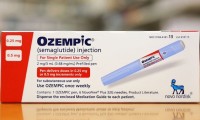-
Reuters
- Source: drugdu
- 160
- January 26, 2024
-
Pfizer’s eye for China ADC deals; Astellas’ gastric cancer rejection
- Source: drugdu
- 141
- January 17, 2024
-
FDA yet to find link between suicidal risk and GLP-1RA use
- Source: drugdu
- 159
- January 16, 2024
-
FDA’s early review finds no evidence linking Novo, Lilly weight-loss drugs to suicidal thoughts
- Source: drugdu
- 89
- January 16, 2024
-
FDA’s Preliminary Review of GLP-1 Meds Finds No Tie to Suicidal Thoughts, Actions
- Source: drugdu
- 166
- January 15, 2024
-
FDA’s Preliminary Review of GLP-1 Meds Finds No Tie to Suicidal Thoughts, Actions
- Source: drugdu
- 101
- January 12, 2024
-
What Was the Most-Repeated Word in CVS Health CEO’s JPM Presentation?
- Source: drugdu
- 121
- January 11, 2024
-
NOVARTIS Cosentyx® (stuccizumab) approved in China for new indication in psoriatic arthritis
- Source: drugdu
- 113
- January 11, 2024
-
Lilly Pens Open Letter Raising Concerns Regarding Use of Mounjaro for Cosmetic Weight Loss
- Source: drugdu
- 177
- January 8, 2024
-
Novo Nordisk, Eli Lilly’s weight-loss drugs under FDA scrutiny for suicidal thoughts, hair loss
- Source: drugdu
- 89
- January 6, 2024
your submission has already been received.
OK
Subscribe
Please enter a valid Email address!
Submit
The most relevant industry news & insight will be sent to you every two weeks.













